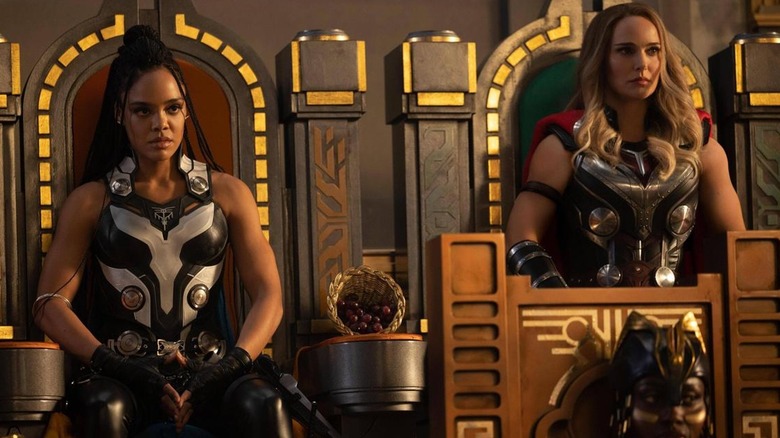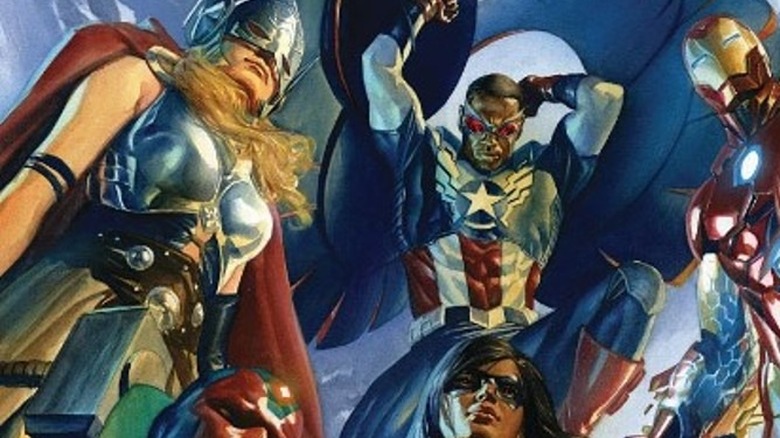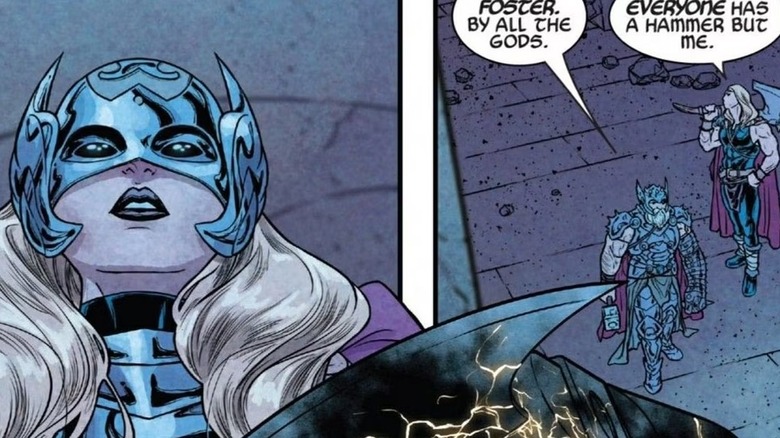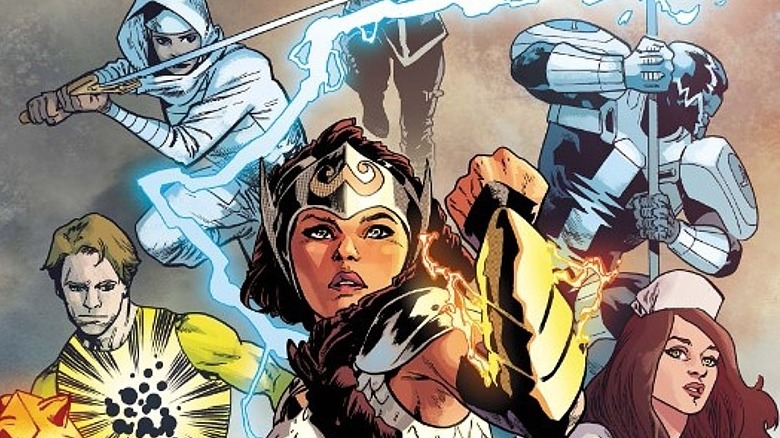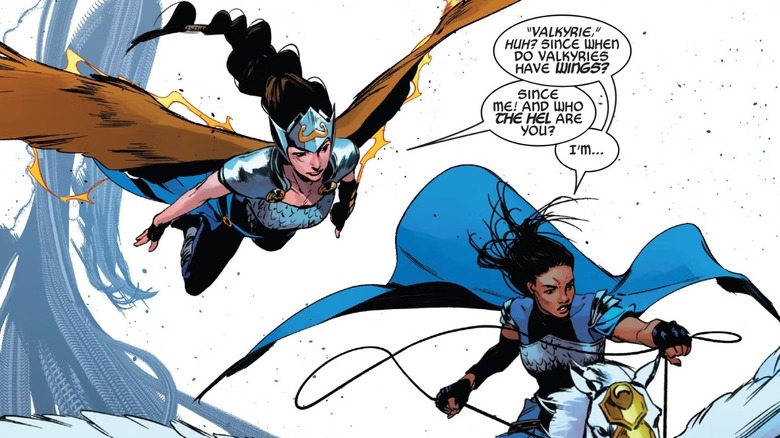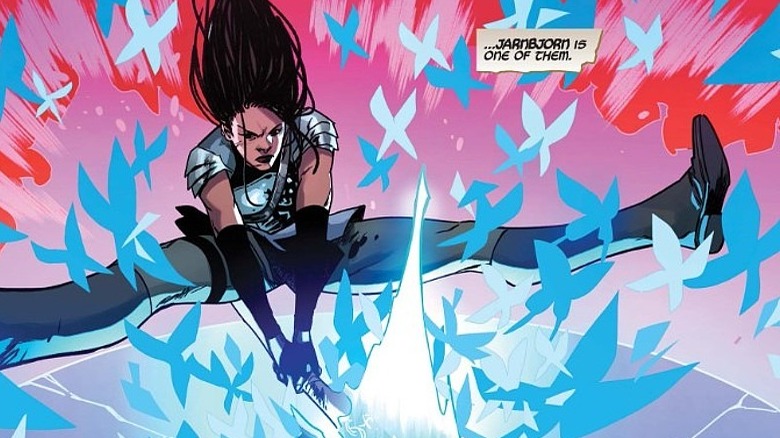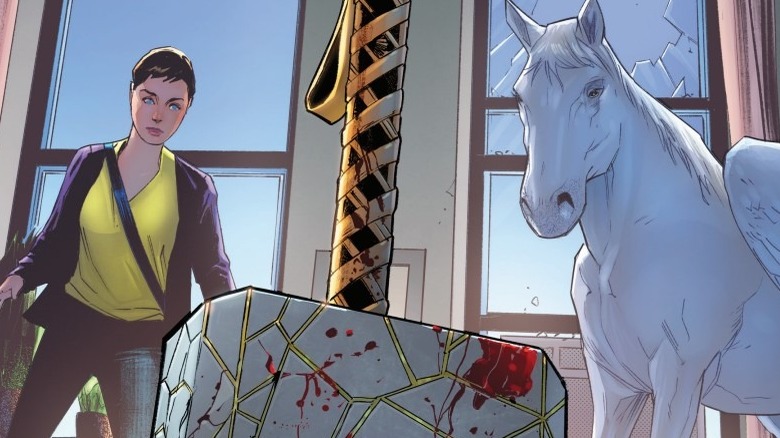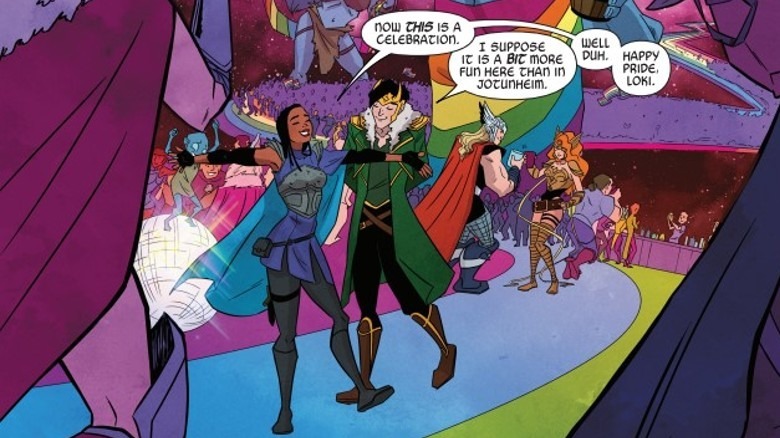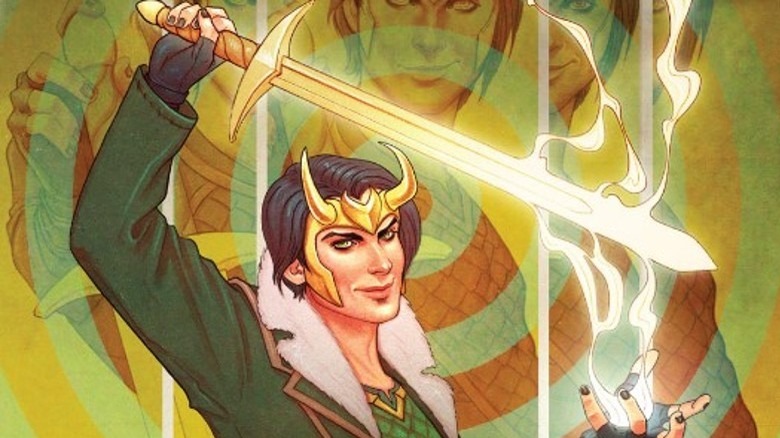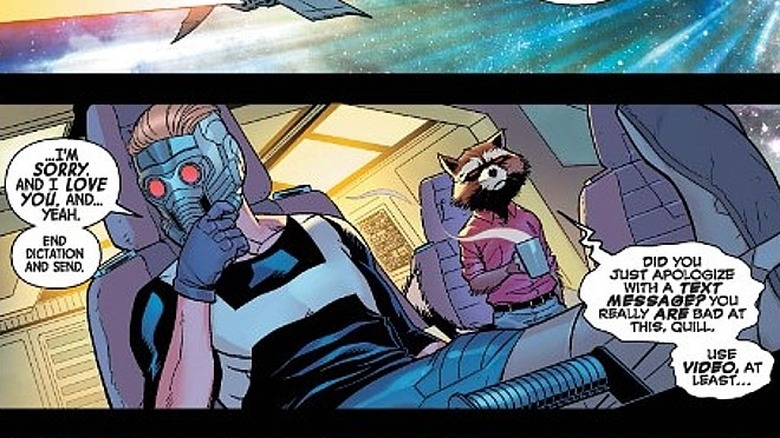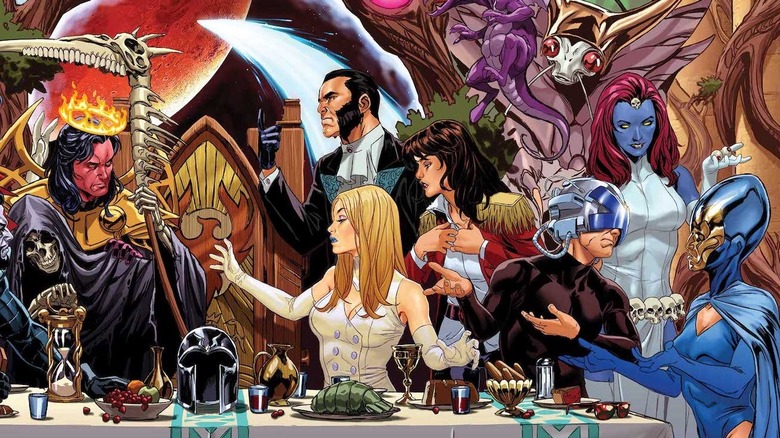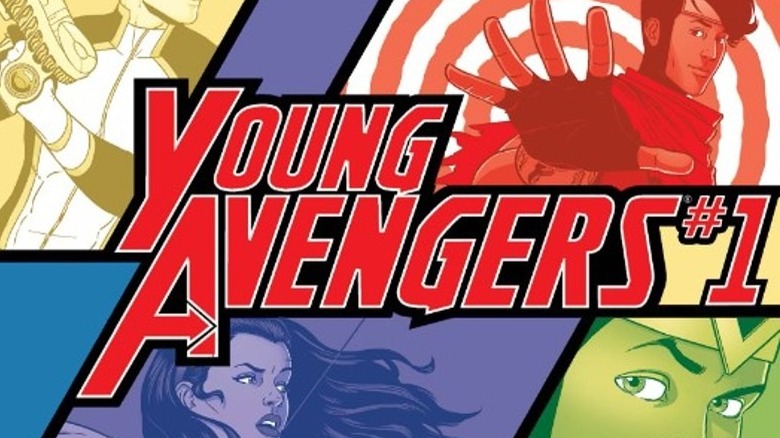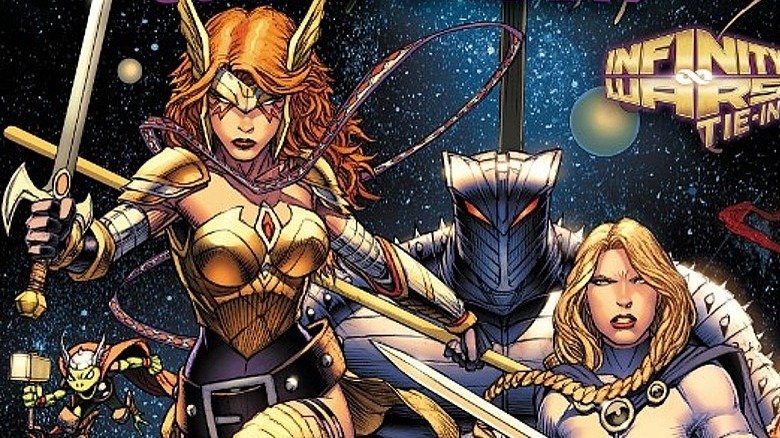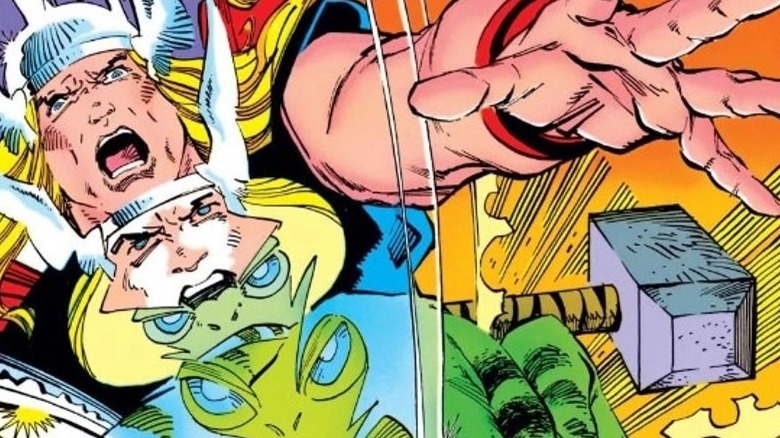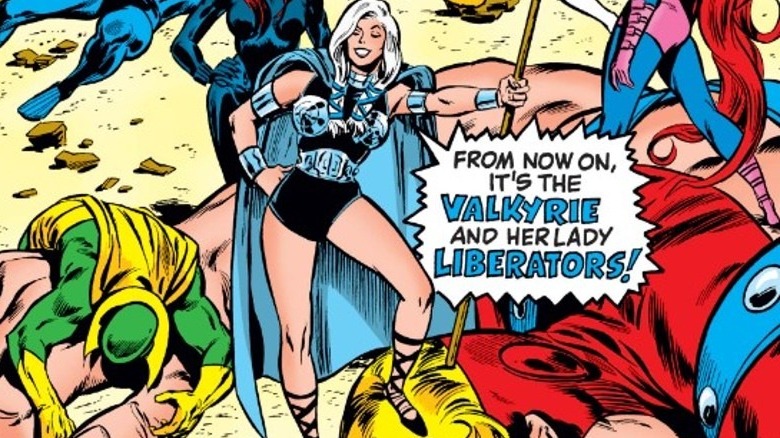14 Best Marvel Comics That Love & Thunder Fans Will Want To Read
The Marvel Cinematic Universe has made a fortune — roughly $25 billion globally — on loosely adapting Marvel Comics series. As a publisher with over 80 years of comic titles, each MCU film has the unenviable task of cherrypicking which iteration of Marvel's characters, timelines, and stories it'll use. Usually, an MCU film or television show will focus on a specific run, like how "Wandavision" primarily used Brian Michael Bendis and Olivier Coipel's "House of M" as a basis for its Scarlet Witch. Or the MCU will borrow aspects of a title (2012's "The Avengers" used Loki as a villain that united the Avengers, similar to the plot of 1963's "Avengers" #1) and handwave the rest away with a cheeky reference.
When "Thor: Love and Thunder" dropped its first trailer, featuring a super buff Natalie Portman wielding Mjolnir, comic readers quickly noted how heavily Jason Aaron's writing on "Thor" and "Mighty Thor" had inspired the film's premise. For a decade, Aaron wrote Dr. Jane Foster as the altruistic mortal who becomes Thor. Aaron and artist Esad Ribić also co-created Gorr, the God Butcher, portrayed by a sullen Christian Bale in the MCU film. However, there are several Marvel comics that fans of Taika Waititi's cosmically queer-led film will love that also forever altered Asgard, Jane's fate, and the Marvel Universe.
All-New, All-Different Avengers
Secret identities are one of the most tested and true tropes of superhero comics. But most of the Big Two's iconic heroes that hide their vigilante-style justice and world-saving hobbies — like Bruce Wayne/Batman and Clark Kent/Superman — are cis-men. However, "All-New, All Different Avengers" finally gave a woman, Dr. Jane Foster, the chance to lead a heroic double life. The Marvel series focuses on Jane secretly balancing her duties as the new Thor and serving on the Asgardian Council of Worlds. Of course, her political life as Jane comes into conflict with her time serving along with fellow Avengers Sam Wilson, Vision, Ms. Marvel, and others. To make matters worse, she learns from Doctor Strange that each time she transforms back into a mortal, her cancer worsens.
"Thor: Love and Thunder" fans who enjoyed seeing Jane Foster take part in the intrigue of Asgardian politics, and the nine realms' secrets, will find a lot to love in this run that takes its battles for justice to the cosmos and ends up jumpstarting a war amongst their ranks. Writer Mark Waid provides plenty of epic in-fighting amongst superheroes, paving the way for a face-off between Mighty Thor and the Hydra-aligned Steve Rogers in "Secret Empire."
War of the Realms
In "Mighty Thor: The Death of The Mighty Thor," Jane Foster decided to wield Mjolnir once more to save Asgard, despite knowing that one more transformation into the Goddess of Thunder will kill her. After defeating Mangog, Jane reverts to her mortal form and dies. Thor resurrects her by using the destroyed Mjolnir's God Tempest powers as a defibrillator. Once Jane Foster returns to the land of the living, she decides to start undergoing cancer treatment. However, it doesn't take long for her to return to her Goddess of Thunder mantle.
At the start of Marvel's "War of the Realms" series, Foster's cancer is in remission and she once again decides to risk her life to help Thor and the nine realms. She becomes the All-Mother, uniting Asgard and Midgard, to fight against Malekith and the Dark Council. Things get out of control fairly quickly. Thor loses an eye. Mjolnir technically returns to power up Thor and Jane but then is broken. Ultimately, an unstable Mjolnir becomes absorbed into Jane, giving her one of the universe's deadliest tools: Undrjarn the All-Weapon, a force that can change into whichever weapon is needed. Eventually, the war leads to the death of all remaining Valkyries. "War of the Realms" is a non-stop battle arc, filled with deadly consequences, magic, and an unstoppable Jane Foster. It's a great read to pick up for newer comics fans wondering how Jane jumped from becoming Mighty Thor to a Valkyrie.
Valkyrie: Jane Foster
In "War of the Realms: Omega" #1, Thor is grieving the Valkyries' deaths. Jane's Undrjarn feels her pain for Thor's loss and decides — because it literally has a mind of its own — to call out to the spirits of Brunnhilde and all previous Valkyries. Her weapon channels the power of the Valkyries into her. Now a warrior goddess, Jane's divine responsibilities are explored in "Valkyrie: Jane Foster," a 10-issue series co-written by Jason Aaron, Al Ewing, and Torunn Gronbekk. For the most part, the run is self-contained and is a great entry point for Jane Foster fans looking to see her in a powerful role that has less to do with Thor's story.
What works best about this new direction for Jane Foster is how the creative team seamlessly blends her medical knowledge with her cosmic duties. Whether or not she's serving as a Valkyrie, Jane always acts with compassion, providing the best care she can. Her journey to accept that some deaths are unpreventable is compelling to watch, especially as she adjusts to her new job of being a ferryman for departed souls. Midway through the Marvel series, the run also notably features the delightful debut of Marvel's Mightiest Medics, uniting some of Marvel's most powerful superhero/medical professionals — such as Doctor Strange and Night Nurse — to use their brain and brawn to save the universe.
King in Black: Return of the Valkyries #1-4
Hands down the best part about "King in Black: Return of the Valkyries" is Rūna's debut in the Marvel Universe. The Marvel character is inspired by the Marvel Cinematic Universe's approach to Tessa Thompson's Valkyrie. While there are some obviously shared traits (her taut stature, being a Black Queer woman, a lover of too much mead), this run ret-cons a lot about what readers previously knew about the Valkyries. Co-created by Jason Aaron, Torunn Grønbekk, and Nina Vakueva, Rūna is one of the original nine warrior goddesses tasked with keeping the gods in check, as well as ferrying the souls of the departed to Valhalla. Notably, she's the original wielder of Jarnbjorn, an ax that can cut through the Celestials' impenetrable armor, making her an entity that the divine are wise not to cross.
After watching Jane struggle with balancing her divine duties, it's rewarding to see her find a comrade with centuries worth of battle experience. But before they pair up, this arc explores how Rūna lost the love of her life and was trapped in the body of a headless Celestial for a millennia, thanks to Knull, God of the Symbiotes. Although it takes a lot of mead and a pep-talk from Mister Horse, Rūna teams up with Jane, recommitting to being a Valkyrie. For fans dying to see more of the MCU's Jane and Valkyrie's screen-time, this is a must-read.
The Mighty Valkyries
While "The Mighty Valkyries" builds on the budding partnership between Rūna and Jane Foster, it's mostly Rūna's story. The miniseries follows Rūna's exploration of her past, including remembering her name, and her current reluctance to continue being a hero. There's a lot of angst for the millennia-old Valkyrie to work through and she's hesitant to be vulnerable around Jane. However, by the end of the five-issue series, the two consider themselves friends. Before they reach that point, all hell breaks loose in the underworld when Hela's wife decides to bring life into the realm. Of course, Loki plays a part in this horrible idea that ends up bringing his grandson, More, to Earth, wreaking even more havoc.
Although the action within this Marvel series embraces some high fantasy concepts, its overall tone is fairly existential. Readers may come for the battles in Hel, but they'll stay for the thought-provoking scenes between Jane and More. As an added bonus, Rūna returns to Asgard for the first time since she's been back in the realm of the living. Once there, she goes drink-for-drink with Thor and reminds him why she's the true wielder of Jarnbjorn, not him. Rūna's sass and confidence are a delight to behold, making her panels with Thor the most reminiscent of Tessa Thompson's Valkyrie that we see in the MCU.
Jane Foster & the Mighty Thor
Jane Foster's current Marvel comic series, "Jane Foster & the Mighty Thor," brings Mjolnir back into her life. Seemingly out of nowhere, Thor's rebuilt hammer appears but the God of Thunder is nowhere in sight. Thor's timing can't be worse as Jane has finally found a balance between her day job as a pathologist and her duties as a Valkyrie. The first issue reveals that Enchantress has helped unleash an interdimensional threat that's as hellbent on destroying Asgard as she is. Ulik the Troll and Hela also have a bone to pick with the Golden Realm.
Rūna and Mister Horse team up with Jane again (although Rūna seems as frustrated as ever with her on-call status that interrupts her first coffee date in a millennia) to save Asgard. With Thor missing, Jane decides to accept Mjolnir so that she can activate her powers as Mighty Thor when the time comes, despite the deadly cost it might have. Of all the Jane Foster stories in the Marvel Universe, this one most closely matches the MCU's style of cosmic action and a big roster of players. "Thor: Love and Thunder" fans will be drawn to this run's blockbuster scale that leads Jane to bring in even more allies and mythic magic to the fight. Plus, it features the return of Odin's spirit in the most fitting way.
Marvel's Voices: Pride (2022) #1
There are several heartwarming and steamy short stories in "Marvel's Voices: Pride" #1 comic, but one of the best ones is "Over the Rainbow." After going to her first Pride event at an East Village bar on Earth, Rūna decides that it's time Asgard had its own celebration too. Rūna then convinces Thor — who is really Loki in disguise, of course — that she's hosting Asgard's first-ever Pride parade. For a realm that's no stranger to genderfluid and queer characters, it seems more than overdue for Asgard to honor its LGBTQ+ community. There's also the added draw of finally seeing warrior Rūna make some time for joy in her life.
Additionally, writer Alyssa Wong pens a hilarious Young Avengers reunion in "All My Exes in the Nexus." In Wong's tale, just about every entity that Loki has dated has captured him, so he calls upon his former teammates for help. Loki has a lot of exes and watching them interact in the same room is a joy to behold. The Marvel short depicts the same kind of charmingly chaotic energy that Taika Waititi brings to the screen in "Thor: Love and Thunder."
Loki: Agent of Asgard
Speaking of chaos, there's nothing more chaotic than Al Ewing's "Loki: Agent of Asgard," in the best possible way. In this run, Loki is attempting to make up for centuries of crimes by serving the All-Mother as a kind of secret agent for Asgard. Every time he completes a mission successfully, one of his misdeeds becomes erased from people's memories. Over the course of the Marvel series' 17-issue run, Loki evolves into someone who feels remorse and genuinely cares about others almost as much as he cares about himself. He starts the run as someone readers find hard to trust, especially since he killed the version of his younger self, Kid Loki, who was a universally beloved version of the trickster. To make matters more complicated, Loki even faces off with a future (and evil) version of himself, King Loki.
Although this series sounds unwieldy, it's impressively self-contained, witty, and packed with high-stakes action. When Disney+'s "Loki" series premiered, Tom Hiddleston discussed the duplicitous nature of his character with EW, asking, "Underneath all those masks, underneath the charm and the wit, which is kind of a defense anyway, does Loki have an authentic self? Is he introspective enough or brave enough to find out?" While the "Loki" series pushed the MCU character to explore his feelings around "self-acceptance," Al Ewing's run did it first and better. Expect a lot of Asgardians to appear in this tale as Loki disappoints and impresses them all ... eventually.
Guardians of the Galaxy (2020)
Without spoiling what role the Guardians of the Galaxy play in "Thor: Love and Thunder," it's safe to say they play a big part. Those craving more GOTG-led tales — and who enjoy Al Ewing's work with Loki — will love Ewing's spin on the ragtag team and its fresh new lineup. 2020's "Guardians of the Galaxy" nails the quippy and outlandish tone of the GOTG family while keeping an earnestness to the characters' strange cosmic adventures.
However, it's worth noting that the 16th issue paves the way for Marvel's "The Last Annihilation" event and its post-Marvel's "Hellfire Gala" event. Comic readers who aren't a fan of crossovers and reading multiple interconnected titles should steer clear of this one. But if seeing characters like Rocket team up with Nova, Tony Stark, Doctor Doom (and so, so many more players) is your thing, look no further. "Thor: Love and Thunder" may be the biggest crossover thus far in the MCU, but it can't hold a candle to Ewing's expansive and zany run; a time when Star-Lord becomes a literal Star-Lord, aka Master of the Sun.
Immortal X-Men (2022)
If you thought Asgardian politics got weird in "Thor: Love and Thunder," just wait until you see what it's like when the X-Men make their own rules. Though this run follows events from titles like "Inferno" and "X Lives/Deaths of Wolverine," it also makes a great starting point for readers looking to meet the current era of X-Men in Marvel Comics. Set in the Krakoan era, a time when X-Men have founded their own planet for them to live safely, Kieron Gillen's run explores the X-Men's Quiet Council. The issues follow who stays and leaves the council and depicts how mutants severely disagree on how to enforce justice, rules, and power.
Imagine if someone mixed the boardroom banter from HBO's "Succession" into the Brotherhood of Mutants with a determined Emma Frost in charge; basically, it's a wildly fun premise filled with intrigue. Notably, the run finally sees the Marvel Universe's Destiny and Mystique romantically reuniting after a long time apart, gifting them with an epic love story.
Young Avengers (2013)
After a strange turn of events, Kid Loki, now a bacon-loving teen, ends up leading the Young Avengers to form. However, this time he's actually a good guy? Sort of. Things are never as simple as they seem whenever Loki is involved, which keeps readers on their toes throughout the GLAAD-winning comic series. A huge part of the run's story is set around Wiccan misuing his magic, causing previously dead Marvel characters (alive in other timelines) to enter their timeline. Like mother, like son. Except, this time none of the mutant and/or Marvel adult heroes can help these teens in trouble, so they save themselves.
While the newest MCU addition, America Chavez/Ms. Marvel, isn't in "Thor: Love and Thunder," she plays a pivotal and leading role in this 2013 series. Unlike her MCU counterpart, this iteration of Ms. Marvel confidently owns each scene and is the unofficial group leader, especially when the boys fight. She'd make the Mighty Thor proud. Of all the comics listed here, "Young Avengers" is the most light-hearted, speedy, and fun ride. One of Taika Waititi's greatest strengths as a filmmaker is how he brings joy to life on-screen. If you're already missing the endorphin hits of "Thor: Love and Thunder," check out this run.
Asgardians of the Galaxy
If you thought the space goats in "Thor: Love and Thunder" was odd, just wait until the events of "Asgardians of the Galaxy" unfold. Thor's half-sister Angela, Valkyrie/Annabelle Riggs, Skurge the Executioner, and Throg aka the frog of thunder, unite to take down Nebula after she steals one of the deadliest weapons in the galaxy. To make matters even weirder, it's Kid Loki (the supposedly beloved one) who assembles this team of Asgardian heroes for his own sinister plans.
There are plenty of pit-stops along this journey, as galactic adventures are known to have, including run-ins with the Ravagers, Asgardian zombies, dark elves, Ego the living planet, and The Undead God of Thunder. Having a Frog God fight against nefarious dark magic forces is the least strange part of this cosmic thrill ride. The events of "Asgardians of the Galaxy" do line up with the "War of the Realms" arc as well, which brings an added layer of context to the death of all Valkyries seen later.
The Mighty Thor #364-366
Loki might be a jerk, but Thor has always been a bit of a bully in the Marvel Universe. While the past decades have shown him to be more humane and tolerant, some of his earlier tales showed off his easily rattled and arrogant fratboy side. In that light, it can be hard sometimes to not root for Loki to one-up Thor. Written and drawn by Thor creator Walt Simonson, "The Mighty Thor" #364-366 has one of Loki's most hilarious takedowns of his big brother.
Watching the majestic (and dim-witted) heir to Asgard get swept away with a broom is exactly the kind of humor that feels befitting of Taika Waititi's self-aware and silly tone. After befriending a group of fellow frogs — and saving them from dreaded rats — the Asgardian God eventually finds his way back to the Golden Realm. What ensues is another battle for the throne between Loki and Thor with predictable results. However, this mini-arc is worth the read just to see the pompous hero get taken down a few pegs by his underestimated brother and staging an amphibian-led rebellion against New York City's rat population.
Avengers #83
The true crime of 1963's "Avengers" #83 is it never actually led to a Marvel series spin-off called "Valkyrie & Her Lady Liberators." Technically, this comic is the first time that we see a Valkyrie appear in the Marvel Universe, though things aren't what they seem. However, the build-up to this reveal is delightful. Scarlet Witch, Wasp, Valkyrie, Black Widow, and Medusa team up to form a superhero group called the Lady Liberators. They vow to fight male oppression and end up taking down the issue's bad guys and all the male members of The Avengers. Written by Marvel's former Editor in Chief Roy Thomas, the story's tone clearly pokes fun at second-wave feminism. Unintentionally, though, it also sheds light on how each of these superhero women have felt ostracized or belittled by the men in their lives.
A good chunk of "Thor: Love and Thunder" explores how Natalie Portman's Jane Foster deals with those who doubt her capabilities and strength, including the God of Thunder, who has, at least in the MCU, always veered into being overprotective of Jane. If you can look past the issue's sardonic tone, "Avengers" #83 is a cathartic read that puts its focus on the often-overlooked women characters in Marvel Comics. Who wouldn't want to see a hero be punched for saying sexist lines like: "I don't fight women, even super-powered ones."
